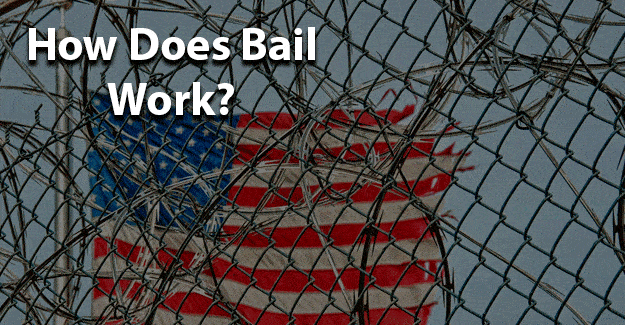How Does Bail Work?
When someone is arrested for suspicion of a crime and taken to jail, he will go through the process called booking. This is when the arrested person is fingerprinted, has a mug shot taken, and provides a statement.
After that, he may be held in custody until the time that their case goes to trial. As often happens in the legal system, this may take a number of weeks or even months before the court date arrives.
The alternative to remaining in custody for that length of time is to pay bail. Bail is an amount of money set by the court that ensures the defendant will appear for all court dates.
If you, or someone you know, has been through this, then you are probably already familiar with the steps in the bail process. This blog post will focus on those steps.
- When Is Bail Set?
- Types of Bail
- Conditions for Forfeiting Bail
- What to Do if Bail Is Not Possible
When Is Bail Set?
Bail is set at the time of the defendant’s first court appearance. This typically happens shortly after the time of the arrest.
The reason for that first appearance is not to enter a plea in the alleged crime but to have the charges read and for the judge to decide on the amount of the bail.
In some cases in which the accused, depending on the severity of the alleged crime, is a member in good standing in society, or not considered to represent a threat of danger or a flight risk, that person may be released without bail under what is called Released on their own Recognizance (ROR).
This person is allowed to remain free and permitted to return to attend all court dates.
Types of Bail
Once bail is set, it may be paid in full by someone acting on the defendant’s behalf, a family member or friend.This is called a Cash bond.
It is usually the most effective way of assuring the person will show up for all court dates. If the defendant attends all court dates, the depositor will receive back the entire amount of the bail except for court costs, fees, or other fines.
If the person does not attend all court dates, the cash bond will be forfeited unless the defendant is turned in to the court or rearrested within 180 days.
Often the amount of bail set by the court is so high that it is not affordable for the defendant’s family. The amount of the bail depends on the severity of the crime and the person’s legal history.
When this happens, the accused’s significant others may contact a bail bond company to arrange for that company to post bail. This is known as a Surety bond.
The bail bond company will typically charge 10% of the bail set by the court. For example, on a $20,000 bail, the premium would be $2,000 and is paid in cash to the bond company.
The premium is non-refundable.
A Property bond is similar to a Surety bond, but here the court places an actual lien on property owned by the defendant or family member. When a defendant is released on his own recognizance or on bail, he is considered to be on supervised release until his court appearance.
The defendant is then required to regularly report for court supervision until the date of the trial. Under pretrial release, he may be subject to random UA’s and placed on a curfew. It is very important to have good legal representation (there are lawyers who will represent the defendant).
If the defendant attends all court appearances, there is no further monetary penalty through the bond company.
Conditions for Forfeiting Bail
However, if the defendant fails to show up or otherwise violates the terms of his supervised release, the guarantor of the bail bond or the bond company will lose the amount of the bail.
The guarantor will be responsible for paying the entire amount of the bail. Often the bail bond company will sue the guarantor in order to collect the entire amount.
If a defendant does not meet the terms of the supervised release or fails to show up for a court date, the bail bond company may then hire an investigator to locate the defendant. If that person is located and brought to court, the company’s bond will be returned.
Of course the defendant does not want to remain in jail any longer than necessary, and the family wants their loved one to be released from jail while awaiting trial, it.
Whether a Cash, Surety, or Property bond, the amount of money involved may still not be affordable to the family. Under these circumstances, it may be possible to get a loan to help pay the bail (there are resources to turn to in order to obtain a loan).
What to Do if Bail is Not Possible
In the event that it is not possible to post bail, the accused must remain in jail until the court date.
It is important to reassure the defendant that the family and friends are there for support throughout the legal process, no matter how long it takes.
After all, it is a very difficult time for everyone involved.
So what do you think about how bail works? What has your experience with bail been like? Please tell us in the comments below.
